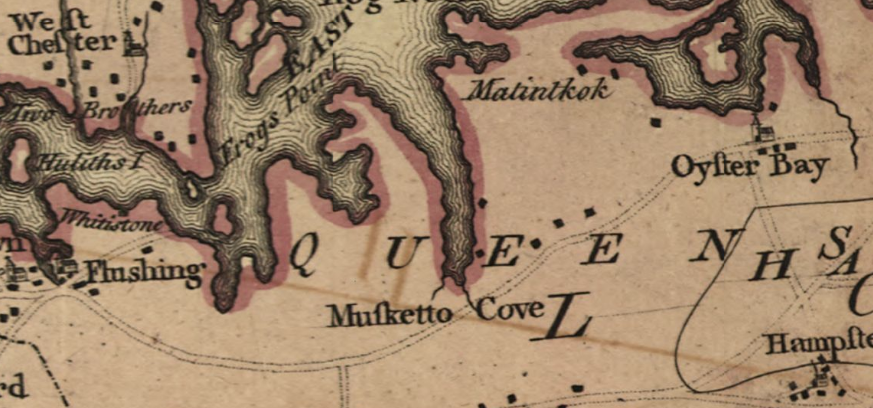Home › Forums › Native Americans › Origins of the Word "Mosholu" › Reply To: Origins of the Word "Mosholu"
That is interesting stuff about the name Muscoota. That must have been a commonly used term among the local native people and not some kind of unique place name as you pointed out. I have seen it translated as meadow or marsh. You have to figure there would have been a lot of places called Muscoota given all of the salt marsh or meadow in the New York area and sure enough you see the word in a few places. This another British Revolutionary map (from 1775) and you can see “Musketto Cove” depicted on Long Island.

Oddly enough I found a reference to a Muscootakes River in a deed to Jacobus Van Cortlandt–only this one does not refer to land in The Bronx but rather to land in Bedford in Westchester:

Funny that the Van Cortlandts were buying land in two different places (The Bronx and Bedford) and they both bordered on running water known as Muscoota. When my children were younger I would take them to a park in northern Westchester called Muscoot Farm and I believe the name is connected to the above river.
On the topic of “Smooth Stones,” I found some interesting stuff as I was researching. The local people spoke Munsee, which is described as either a language in the Algonquian family of languages or an Algonquian dialect. According to this book, Mamusqunke in Connecticut meant “smooth stones” to the Quinnipiac, who also spoke an Algonquian language.
I kind of stumbled upon the information that I wrote about in my article–I did not set out trying to find the origin of Mosholu. I was researching the “Upper Cortlandts” house when I learned that the guy that lived there, T. Bailey Meyers, was the one that named the post office “Mosholu” and that he also collected Revolutionary War manuscripts.
Tom mentioned Gun Hill Road in his earlier reply. In a similar way I also stumbled upon some information that leads me to question the common origin story of the name “Gun Hill.”